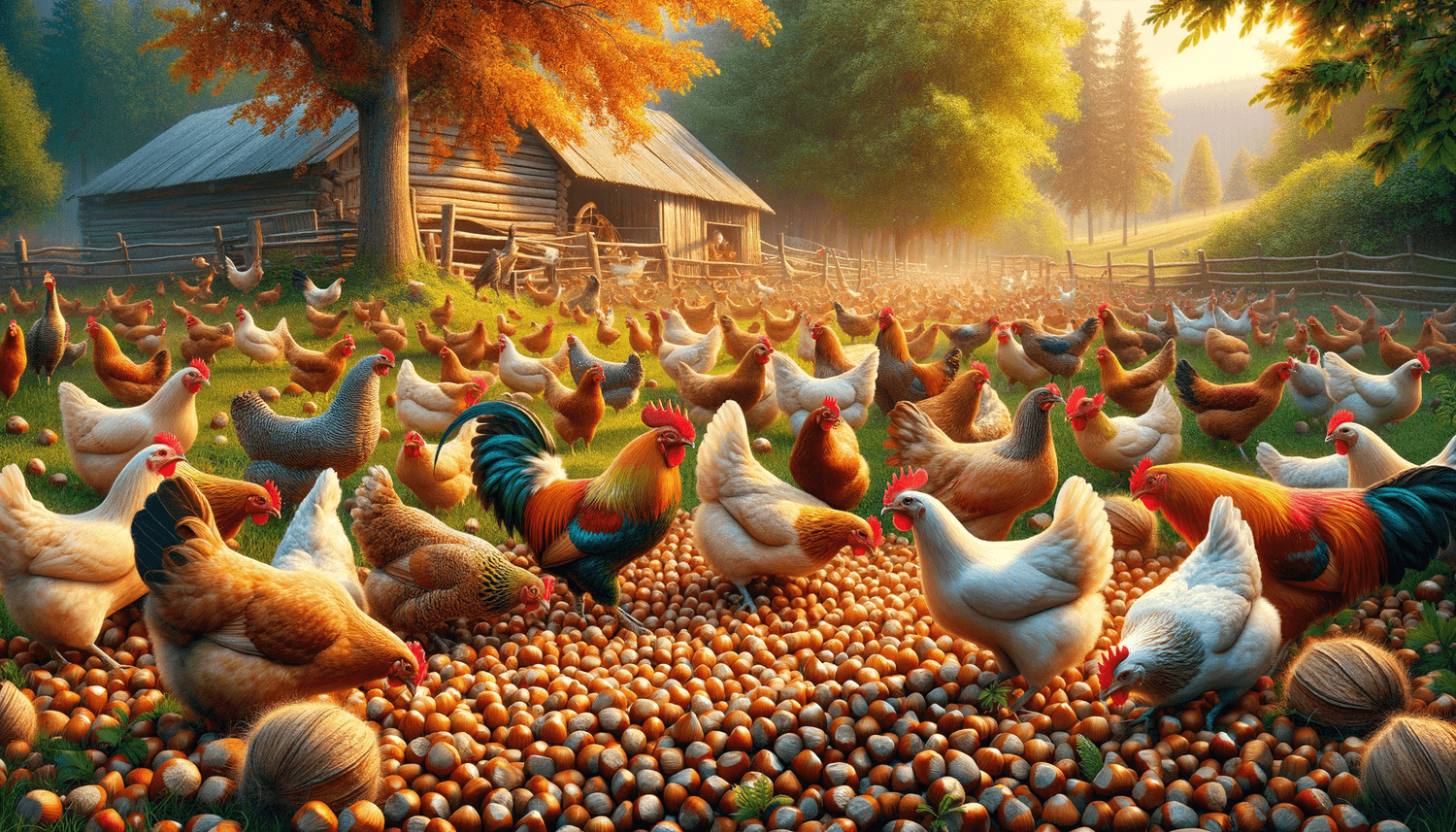Are you nuts for hazelnuts? If so, you might be wondering if your feathered friends can share in the joy of these tasty treasures. In today’s blog post, we’ll embark on a clucking good adventure to explore the world of chickens and hazelnuts. Buckle up, for we’re about to crack open the facts behind a nutty conundrum: Can chickens eat hazelnuts? From the importance of a balanced diet to the potential benefits and risks, from nutritional values to preparation tips, we’ve got you covered as hens love to be in our coop of knowledge!
Can chickens eat hazelnuts?
Yes, chickens can eat hazelnuts, and they are generally safe for consumption. Hazelnuts are packed with nutrients that can be beneficial to your flock, such as protein, healthy fats, and vitamins. However, it’s important to ensure that hazelnuts are served in moderation and are an occasional treat, rather than a primary foodsource, to maintain a balanced diet for your chickens.
A balanced diet for happy, healthy chickens
Just like their human caretakers, chickens need a balanced diet to ensure they remain in good health, maintain their energy levels, and keep laying those delicious eggs. Striking the right balance between essential nutrients allows your feathered friends to live their best lives and continue to thrive.
At the core of a chicken’s diet should be high-quality chicken feed, which contains a blend of key nutrients necessary for their growth and well-being. Ideally, chicken feed should make up around 80-90% of their daily intake, creating a solid nutritional base to keep them clucking with joy. Your flock will greatly benefit from carefully selected feed, formulated to meet their specific needs, such as layers’ feed for egg-laying hens or growers’ feed for young, developing birds.
As for the remaining 10-20% of their diet, treats like fruits and vegetables can be introduced to provide variety, interest, and additional nutrients. Just remember to do so in moderation to avoid disrupting the balance created by their primary chicken feed intake. By offering a balanced diet, you’ll not only ensure the health and happiness of your backyard chickens but will also be rewarded with a bountiful supply of high-quality eggs.
Nutritional value of hazelnuts for chickens.
Feeding hazelnuts to chickens can indeed provide them with a nutritional boost, as these nuts contain several beneficial components. One of the primary advantages of hazelnuts is their rich protein content, which is essential for maintaining strong muscles and overall physical health in chickens. Protein is particularly crucial for laying hens, as egg production demands a substantial amount of energy and resources from their bodies.
In addition to protein, hazelnuts also offer healthy fats that serve as a valuable energy source for chickens. These fats can help to maintain the vitality and vigor of your flock, ensuring that they remain active and engaged in their environment. Furthermore, these unsaturated fats can contribute to the quality of the eggs produced by laying hens, as the nutrients are passed on to the yolk.
But the nutritional benefits of hazelnuts don’t end there! These tasty nuts also pack an array of important vitamins and minerals that contribute to the well-being of your chickens. Hazelnuts are high in vitamin E, a potent antioxidant that supports the immune system, and B vitamins, which play a vital role in energy metabolism and promoting healthy skin, feathers, and beaks. Minerals such as manganese, copper, and magnesium found in hazelnuts further contribute to robust skeletal development and enzyme function in chickens.
Despite their nutritional value, it’s essential to remember that hazelnuts should be fed to chickens as an occasional treat and not as a primary source of nutrition. Their valuable vitamins, minerals, proteins, and healthy fats can complement a chicken’s overall diet, but nothing can replace the importance of high-quality chicken feed as the foundation of their nutritional intake.
Nutrition table of hazelnuts for chickens.
| Information | Description |
|---|---|
| Nutritional Value | High in protein, healthy fats, vitamin E, B vitamins, and minerals such as manganese, copper, and magnesium. |
| Suggested Serving Size | Small amounts, making up no more than 10-20% of the chicken’s diet. |
| Safe Feeding Practices | Feed in moderation as an occasional treat, and not as a primary food source. Always provide access to grit for proper digestion. |
| Preparation | Shell and crush hazelnuts into small pieces before feeding to chickens. |
| Potential Risks | Overfeeding can lead to an imbalanced diet and potential health issues. Ensure proper digestion by providing access to grit. |
| Hydration | Provide fresh water at all times; hazelnuts don’t contribute to hydration. |
| Digestion | Access to grit is essential for optimal digestion of hazelnuts. |
| Seasonal Availability | Typically available during fall and early winter. |
| Other Benefits | Contributes to high-quality egg production and supports healthy skin, feathers, and beaks when fed in moderation. |
Introducing hazelnuts to your chickens
When introducing hazelnuts to chickens for the first time, start gradually and supervise their reaction to ensure they are relishing the treat without experiencing any potential issues. Monitor their general health, digestion, and egg production to determine if hazelnuts can become a regular addition to their diet.
Cracking the shells: preparing hazelnuts for your chickens
Before serving hazelnuts to your chickens, always remove the shells. The hard, outer shell can be a choking hazard or cause injury to their digestive system. To make it even easier for your birds to consume, crush the shelled hazelnuts into smaller pieces. Smaller bits are less likely to cause digestive problems and will be more appealing to your flock.
Conclusion: moderation is key
In conclusion, while hazelnuts can be a beneficial and delicious treat for your chickens, it’s important to serve them in moderation. Overfeeding can result in an imbalanced diet and potential health issues. By providing shelled, crushed hazelnuts as a nutritious and occasional treat, alongside their usual high-quality chicken feed, you’ll keep your backyard flock happy and healthy!

















